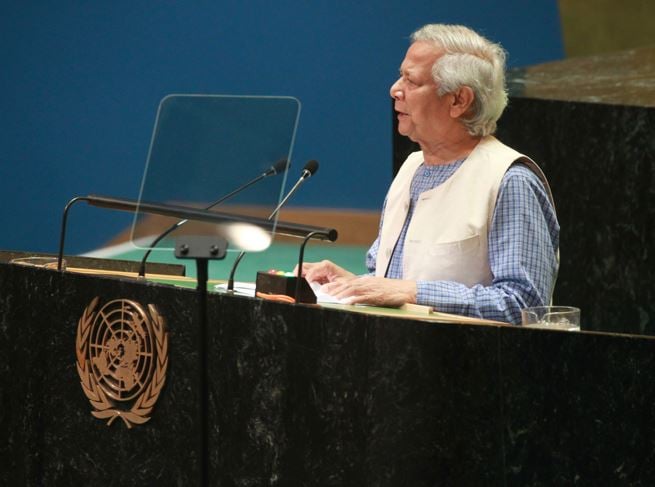
NEW YORK, Sept 27, 2024 (BSS) - Chief Adviser Professor Muhammad Yunus today expressed cautions over development of 'autonomous intelligence' that may pose threats to human existence.
"As the scientific community and the world of technology keeps moving on developing 'autonomous intelligence' - artificial intelligence that propagates on its own without any human intervention - we all need to be cautious of possible impact on every human person or our societies, today and beyond," he told the 79th session of the United Nations General Assembly (UNGA) here.
Delivering his speech in Bangla, Prof Yunus said many have reasons to believe that unless autonomous intelligence develops in a responsible manner, it can pose threats to human existence.
"We are particularly enthused with emergence of the Artificial Intelligence tools and applications. Our youth are excited with the prospect of fast unfolding generative AI. They aspire to walk and work as global citizens," he said.
The chief adviser said the world needs to ensure that no youth in countries like Bangladesh get left behind in meaningfully reaping benefits from the AI-led transformation.
The world simultaneously needs to ensure that the development of artificial intelligence does not diminish the scope or demand for human labour, he said.
He said every year, nearly two and a half million Bangladeshis enter labour market. "In a large population where nearly two-third is young, Bangladesh is challenged to make learning suited to meet the needs of today and tomorrow," he added.
Prof Yunus observed that the world of work is changing where a younger person has to adapt constantly, re-skill, adopt newer attitudes.
"As Bangladesh is set to graduate as a Middle Income Country, we reckon the vital need to secure ourselves in terms of learning and technology," he added.
He said newer forms of collaboration are needed where global business and knowledge-holders connect to people's needs.
International cooperation should create space for the developing countries in ways that can bring transformative applications or solutions for jobs, endemic socioeconomic challenges, or livelihoods, the chief adviser added.
About public health, he said in WHO, as Bangladesh leads the negotiations on a global Pandemic Treaty, it urges for convergence on the key provisions of adequate international cooperation, financing public health systems, technology transfer, research and development, diversification of production of medical diagnostics-vaccines-therapeutics.
Stressing the need for declaring vaccines a 'global public good' that is free from the rigours of intellectual property, the Nobel Laureate said that these are also crucial for combating the scourge of non-communicable diseases.
Referring to this year's golden jubilee celebration of Bangladesh's partnership with the United Nations, he said it has been a shared journey of mutual learning.
"In our modest ways, Bangladesh contributed towards promoting global peace and security, justice, equality, human rights, social progress and prosperity. And, indeed in building a rules-based international order," he said.
Prof Yunus, the father of microfinance, recalled the Microcredit Resolution and the Friends of Microcredit that was formed in the UN General Assembly back in 1999, with exceeding spontaneity.
The United Nations declared 2005 as the Year of Microcredit that resulted in global reach of microcredit, he said, adding that the annual General Assembly Resolution on Culture of Peace since 2001 or the Resolution 1325 in the Security Council on Women, Peace and Security may be worth recalling as well.
Prof Yunus said every year developing countries face a significant SDG financing gap, estimated between US$ 2.5 and US$ 4 trillion, while high debt burdens, shrinking fiscal space, and adverse impacts of climate change put countries like Bangladesh at greater risk.
"We look forward to the Fourth International Conference on Financing for Development to deliver on addressing the complex and systemic challenges," he said.
About migration and mobility, the chief adviser said while Bangladesh remains committed to the full implementation of the Global Compact on Migration, his government is also committed to curve unsafe migration.